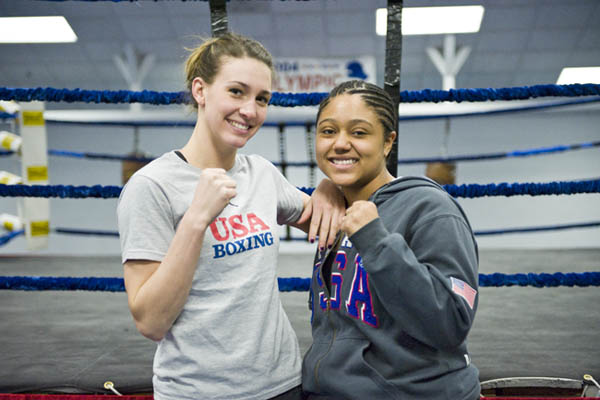
Women’s boxing has only made a brief appearance in the Olympics as a demonstration sport in the 1904 Olympic Games in St. Louis.
The last time that it was considered by the International Olympic Committee (IOC) to be an Olympic event was 2005. It was rejected because the Executive Board thought it had not made enough progress to be considered an Olympic sport.
In August 2009, the issue was revisited by the IOC, along with several other sports, and finally approved to be a sporting event in the 2012 Olympic Games in London.
The original 11 male boxing events (classified by weight classes) will now be replaced with 10 male events and three female events: flyweight (51kg/112lb), lightweight (60kg/132lb), and middleweight (75kg/165lb).
Following this historic decision, the USOEC immediately started searching for USA Boxing’s toughest female competitors in order for the U.S. to have a competitive edge in this relatively young discipline.
New to the USOEC and NMU are two of the top female boxers in the country: Mikaela Mayer of West Hills, Calif., and Raven Barnes of Ypsilanti, Mich.
Mayer, 20, has only been boxing for three years but she is a two-time national champion, one-time national silver medalist, and ranked fourth in the country at the 132lb weight class.
When she first started at 17, she was just looking for an extracurricular activity to keep her in shape.
“I didn’t even research any gyms; I just walked to the gym closest to my house. I signed myself up for female boxing classes that were only twice a week,” Mayer said. “I got addicted and started going every day.”
Mayer said she is very grateful for the trainers she’s had over the years because they have all devoted time and effort into her career and not asked for anything in return.
“The trainer at my gym took me under his wing and gave me one-on-one time. He started me fighting and then I started winning, and now I’m here,” Mayer said.
Barnes’ story is a little different from her teammate’s; she knew from a very early age that she wanted to box.
“I started because it’s something I wanted to do since I was little. My uncle found me a gym 20 minutes from home, A-Square Fight Club in Ann Arbor, and I’ve been with them ever since,” Barnes said.
Coming into the USOEC program, the 17-year-old’s resume included: 2009 Jr. Olympic Champion, 2009 National PAL Champion, 2010 USA Boxing Bronze Medalist and is ranked third at the 178lb-plus weight class.
Barnes has to drop weight for the Olympics and compete at a new weight class, but she said she is not concerned with the change.
“I have to get down to 165, I’ll be stronger and quicker,” Barnes said.
Barnes credits her long time coach Eric McGuire, of A-Square Fight Club, for helping her get into the program.
“He is the one who found out about the program and had me fill out applications. He said he wouldn’t have sent me up here if he didn’t know I was good, and that’s a huge motivation for me,” Barnes said.
Both fighters are excited for the opportunity to train at the USOEC. Since the B.J. Stupak scholarship covers tuition, room, and board, they can devote all of their time to training and schoolwork.
“It’s easier up here because back home I was working 30 hours a week, babysitting every day, and going to school full time on top of training. Up here I can really focus my energy and time on what matters: training and school,” Barnes said.
With the Olympic trials less than a year away, all the additional time to focus on training will be a great deal of help, even with a new coach so close to the trials. Coach Al Mitchell’s successful track record is more than enough reassurance that the change in trainer will be a positive one for the girls.
“I came here with an open mind, because at home I was wondering if I was getting the right training and the right kind of style help. Al’s produced 300 champions and something like 10 Olympians; that alone shows me I’m going to get the right training and I am excited to work with him,” Mayer said.
























